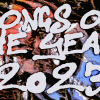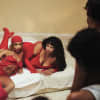Update: Tinashe has taken to Twitter to respond to her quotes on colorism and industry success with The Guardian. "I was not talking about colorism in the industry. This is taken out of context," Tinashe clarified. "The article framed it as such, about success in music, where as the conversation we had was about my experiences growing up in general."
I was not talking about colorism in the industry. This is taken out of context.
— TINASHE (@Tinashe) June 13, 2017
The article framed it as such, about success in music, where as the conversation we had was about my experiences growing up in general.
— TINASHE (@Tinashe) June 13, 2017
Tinashe provided updates on her long-awaited Joyride album in a new interview with The Guardian, explaining that she's still recording for the record and plans to release it later in 2017. “Things haven’t always gone according to my original plan,” Tinashe said of the album's delays. “But that’s life, and things change.”
One of the reasons that the singer discusses for her the stalls in her career is the idea, perpetuated on social media, that there's only room for a few black women at the top of the pop charts. Tinashe, whose mother is Danish and father is Zimbabwean, said that this disparity also boils down to colorism:
There’s colorism involved in the black community, which is very apparent. It’s about trying to find a balance where I’m a mixed woman, and sometimes I feel like I don’t fully fit into the black community; they don’t fully accept me, even though I see myself as a black woman. That disconnect is confusing sometimes. I am what I am.
Elaborating on the inequality in the pop realm for black women, Tinashe said that there's a competition for space that doesn't exist for her male counterparts:
Recently, my cousin was with a friend of a friend, who was in high school, and she was like, “I’m a fan of Kehlani,” but in a way that was like, “So I can’t be a fan of Tinashe, too.” Then my friend posed the question, “Why not be a fan of both?” It’s kind of like sport; people feel like they have to pick a side… There are hundreds of [male] rappers that all look the same, that sound the same, but if you’re a black woman, you’re either Beyoncé or Rihanna. It’s very, very strange… It felt like they almost had to sacrifice someone because there wasn’t enough room, which isn’t true.
Read Tinashe's full interview with The Guardian here.


